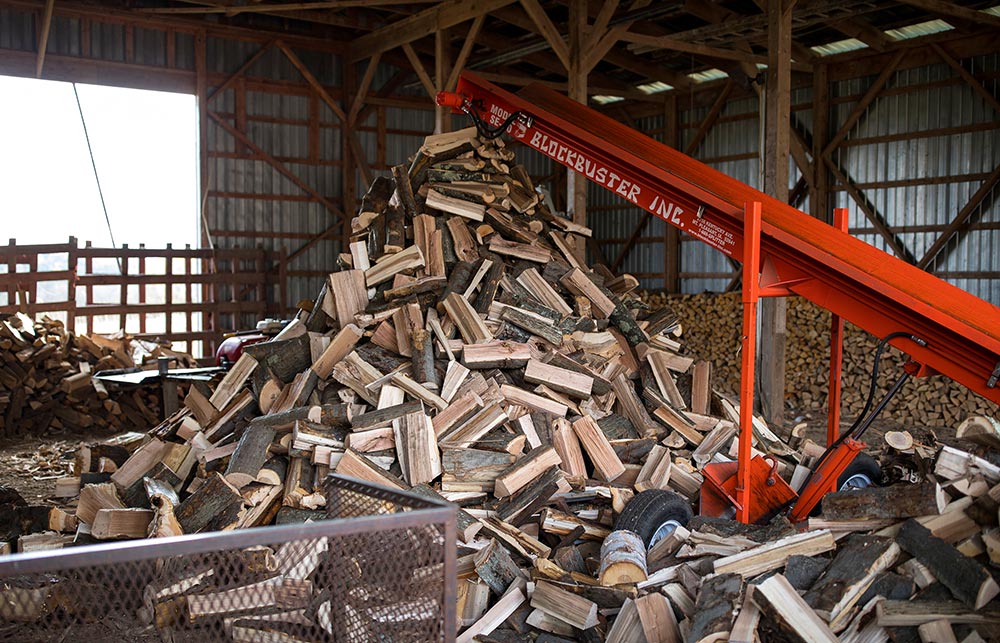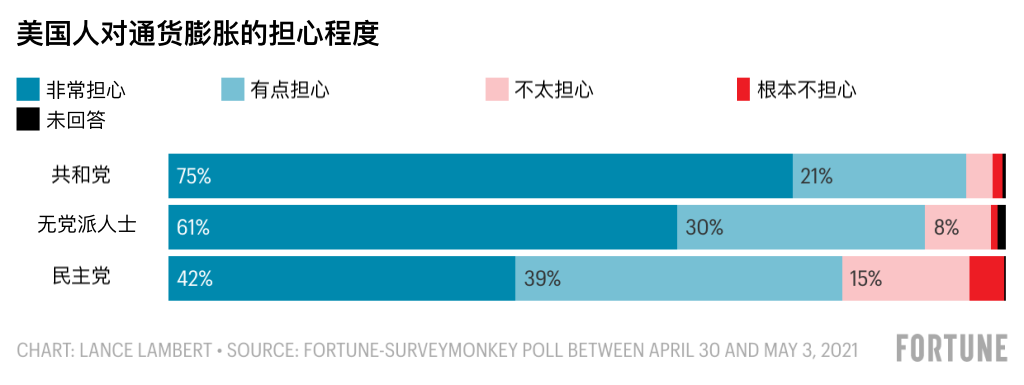 图片来源:ROBERT NICKELSBERG—GETTY IMAGES
图片来源:ROBERT NICKELSBERG—GETTY IMAGES上周,当美国财政部部长珍妮特·耶伦表示利率可能会上升时,所有投资者都听出了“通货膨胀”和股市下跌的意思。耶伦很快又退了一步说:“我认为不会有通货膨胀的问题,但如果真的出现,我们还可以寄希望于美联储来解决。”
美联储的确预见了物价将在2021年以更快的速度上涨,但美联储主席杰罗姆·鲍威尔将其称之为“暂时性”的通胀。随着经济全面复苏,所有商品和服务的价格都将飙升。自新冠疫情开始以来,仅木材一项就已经增长了280%。但是,当市场需求被压抑后的“报复性回弹”过去,2021年的涨价潮就会慢慢回到正轨。至少美联储是这么说的。
那么美国人对潜在的物价上涨有何反应?为了找出答案,《财富》杂志与SurveyMonkey合作,在4月30日至5月3日期间,对2113名美国成年人展开了调查。*该调查的模型化误差估计为正负3个百分点。
《财富》杂志与SurveyMonkey的调研发现,87%的成年美国人都担心通货膨胀,其中58%表示“非常担心”。这种担心已经能够改变消费者的行为了:当人们担心物价上涨时,他们就会趁价格还稳定在当前水平,尽快消费。这可能会引起对住房或汽车等物品的抢购大战。
美国人对经济的看法通常还取决于他们支持的党派是否当政。下图是《财富》杂志此前的一张分析图表,从中就可以看出,在乔·拜登上台后,共和党人和民主党人是如何改变他们的看法的。因此,共和党人中(75%)表示“非常关注”通胀的人数远远超过民主党(42%)就不足为奇。无党派人士(61%)则处在中间水平。现在,人们非常担心物价上涨,而账面上的通货膨胀率仍然很低,问题就来了:如果通货膨胀上升,这会成为一个政治问题吗?
 美国人对通货膨胀的担心程度。资料来源:《财富》与SurveyMonkey于2021年4月30日至5月3日期间进行的调研
美国人对通货膨胀的担心程度。资料来源:《财富》与SurveyMonkey于2021年4月30日至5月3日期间进行的调研房价已经开始飙升,成交价的中位数同比增长16%。这从人口统计学上也有迹可循——千禧一代进入了购房高峰阶段,加上现在的房贷利率处于历史低位,大批购房者涌入数量有限的住房市场。根据房屋交易网站realtor.com的数据显示,待售房屋的数量同比下降了50%以上。
从服务业经济上看,从夜生活、游乐园到爱彼迎民宿,之前被新冠疫情压抑的需求也出现惊人的“报复性反弹”。这也为价格急剧上涨奠定了基础。机票预订量明显增加,机票价格也明显上涨。
但涨幅最大的还是商品:玉米、钢铁和铜等。但木材的涨幅几乎是最高的:根据木材行业资讯网站Random Lengths报道,5月7日,每千板英尺木材的价格飙升至创下历史新高的1414美元。自疫情爆发以来,木材价格暴涨了295%。这样的结果是木材的供需关系出现史无前例的失衡导致的——在疫情爆发带来的种种后果中,这也很符合常理。
美联储很可能是对的:住房、商品和服务成本的迅速上涨是“暂时的”。但这一点并不妨碍它可能发展成一个政治问题——只需要回顾一下20世纪70年代和本世纪00年代的两次“暂时性”的石油危机以及后续的政治后果就能够知道答案了。(财富中文网)
编译:陈聪聪
上周,当美国财政部部长珍妮特·耶伦表示利率可能会上升时,所有投资者都听出了“通货膨胀”和股市下跌的意思。耶伦很快又退了一步说:“我认为不会有通货膨胀的问题,但如果真的出现,我们还可以寄希望于美联储来解决。”
美联储的确预见了物价将在2021年以更快的速度上涨,但美联储主席杰罗姆·鲍威尔将其称之为“暂时性”的通胀。随着经济全面复苏,所有商品和服务的价格都将飙升。自新冠疫情开始以来,仅木材一项就已经增长了280%。但是,当市场需求被压抑后的“报复性回弹”过去,2021年的涨价潮就会慢慢回到正轨。至少美联储是这么说的。
那么美国人对潜在的物价上涨有何反应?为了找出答案,《财富》杂志与SurveyMonkey合作,在4月30日至5月3日期间,对2113名美国成年人展开了调查。*该调查的模型化误差估计为正负3个百分点。
《财富》杂志与SurveyMonkey的调研发现,87%的成年美国人都担心通货膨胀,其中58%表示“非常担心”。这种担心已经能够改变消费者的行为了:当人们担心物价上涨时,他们就会趁价格还稳定在当前水平,尽快消费。这可能会引起对住房或汽车等物品的抢购大战。
美国人对经济的看法通常还取决于他们支持的党派是否当政。下图是《财富》杂志此前的一张分析图表,从中就可以看出,在乔·拜登上台后,共和党人和民主党人是如何改变他们的看法的。因此,共和党人中(75%)表示“非常关注”通胀的人数远远超过民主党(42%)就不足为奇。无党派人士(61%)则处在中间水平。现在,人们非常担心物价上涨,而账面上的通货膨胀率仍然很低,问题就来了:如果通货膨胀上升,这会成为一个政治问题吗?
房价已经开始飙升,成交价的中位数同比增长16%。这从人口统计学上也有迹可循——千禧一代进入了购房高峰阶段,加上现在的房贷利率处于历史低位,大批购房者涌入数量有限的住房市场。根据房屋交易网站realtor.com的数据显示,待售房屋的数量同比下降了50%以上。
从服务业经济上看,从夜生活、游乐园到爱彼迎民宿,之前被新冠疫情压抑的需求也出现惊人的“报复性反弹”。这也为价格急剧上涨奠定了基础。机票预订量明显增加,机票价格也明显上涨。
但涨幅最大的还是商品:玉米、钢铁和铜等。但木材的涨幅几乎是最高的:根据木材行业资讯网站Random Lengths报道,5月7日,每千板英尺木材的价格飙升至创下历史新高的1414美元。自疫情爆发以来,木材价格暴涨了295%。这样的结果是木材的供需关系出现史无前例的失衡导致的——在疫情爆发带来的种种后果中,这也很符合常理。
美联储很可能是对的:住房、商品和服务成本的迅速上涨是“暂时的”。但这一点并不妨碍它可能发展成一个政治问题——只需要回顾一下20世纪70年代和本世纪00年代的两次“暂时性”的石油危机以及后续的政治后果就能够知道答案了。(财富中文网)
编译:陈聪聪
When Treasury Secretary Janet Yellen said last week that interest rates could rise, all investors heard was the I-word and stocks dropped. Yellen quickly walked back that statement: "I don’t think there’s going to be an inflationary problem, but if there is, the Fed can be counted on to address it."
The Federal Reserve does see prices rising at a faster pace in 2021, but Chair Jerome Powell calls it "transitory" inflation. As the economy hits full gear, prices for everything from commodities to services will spike. Lumber alone is already up 280% since the onset of the pandemic. But once the burst from pent-up demand passes, 2021 price hikes should correct. At least that's the Fed's narrative.
So how are Americans reacting to the potential for price hikes? To find out, Fortune teamed up with SurveyMonkey to poll 2,113 adults in the U.S. between April 30 and May 3.* The poll's modeled error estimate is plus or minus 3 percentage points.
The Fortune-SurveyMonkey poll finds 87% of U.S. adults are concerned about inflation, including 58% who say they are "very concerned." That can already cause a change in consumer behavior: When people are afraid of prices rising, they spend money faster in order to lock in a price. This could result in bidding wars on things such as homes or cars.
Americans' view of the economy often depends on whether their party occupies the White House. Just look at this past Fortune Analytics chart and see how Republicans and Democrats flipped views after Biden took office. So it isn't surprising that the share of Republicans (75%) who are "very concerned" about inflation is much higher than Democrats (42%). And Independents (61%) are right in the middle. Given how high those concern levels are now—with inflation still pretty low on paper—it poses the question: If inflation takes off, will it become a political issue?
Already, prices are soaring in the housing market, with the median sales price up 16% year over year. That's the result of demographics—millennials hitting their peak home-buying years—and historically low mortgage rates combining to create an influx of buyers who bid up a limited number of homes. The number of homes for sales is down over 50% year over year, according to realtor.com.
There's also an incredible amount of pent-up demand in the service side of the economy, for everything from nightlife to amusement parks to Airbnb rentals. That's also setting the stage for steep price hikes. We're already seeing a huge rise in booked flights—and upped flight prices.
But the biggest price hikes are in commodities: corn, steel, and copper, for instance. But none more so than lumber: On May 7, the price per thousand board feet of lumber soared to an all-time high of $1,414, according to Random Lengths. Since the onset of the pandemic, the price of lumber has skyrocketed 295%. This is the result of an unprecedented mismatch in lumber supply and demand—something set off by pandemic-spurred trends in TK.
The Fed very well could be right: The rapid rise in housing, commodities, and services costs is "transitory." But that alone won't prevent it from becoming a political issue. Just look back at the temporary oil shocks in the 1970s and 2000s—and the subsequent political backlash.






